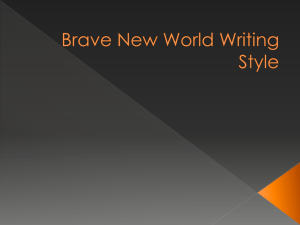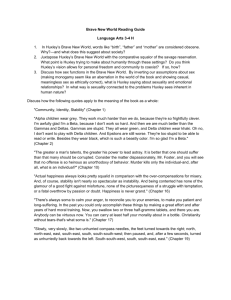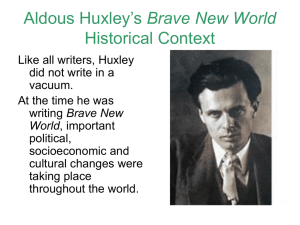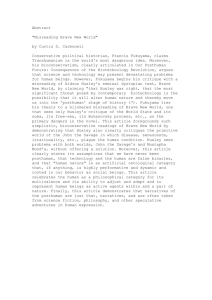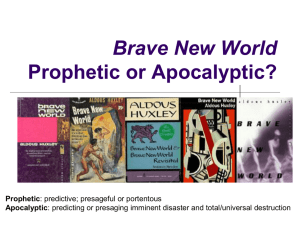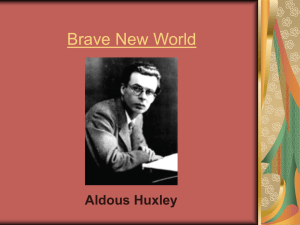05 27 15 BNW Day 3 AP Lit.doc
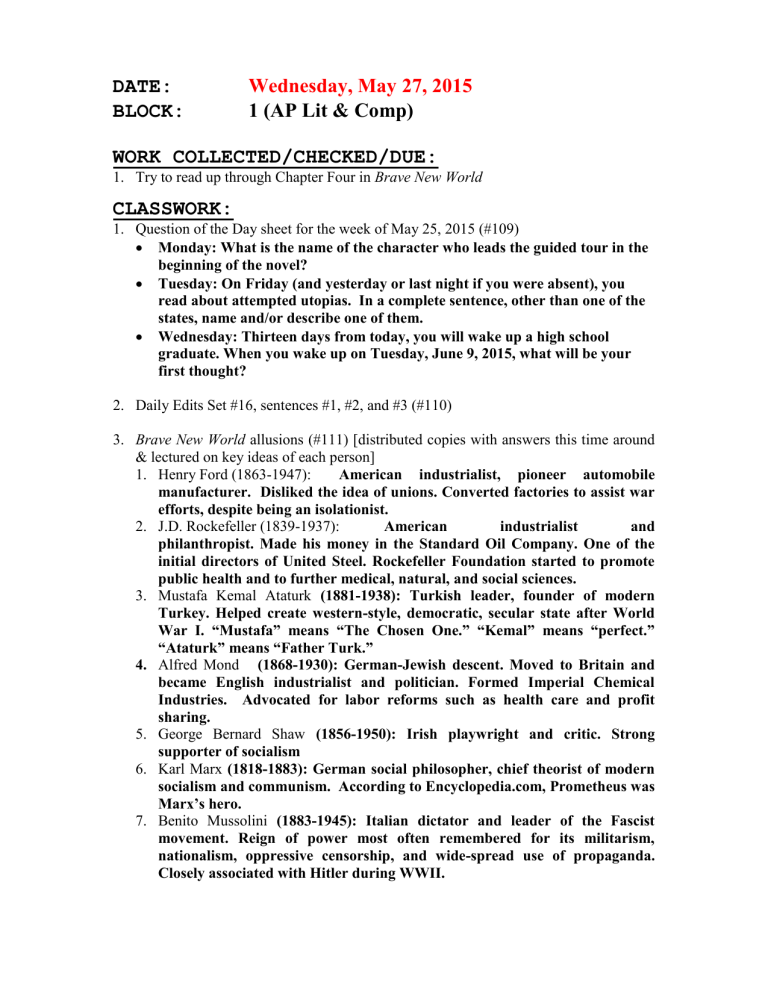
DATE: Wednesday, May 27, 2015
BLOCK: 1 (AP Lit & Comp)
WORK COLLECTED/CHECKED/DUE:
1.
Try to read up through Chapter Four in Brave New World
CLASSWORK:
1.
Question of the Day sheet for the week of May 25, 2015 (#109)
Monday: What is the name of the character who leads the guided tour in the beginning of the novel?
Tuesday: On Friday (and yesterday or last night if you were absent), you read about attempted utopias. In a complete sentence, other than one of the states, name and/or describe one of them.
Wednesday: Thirteen days from today, you will wake up a high school graduate. When you wake up on Tuesday, June 9, 2015, what will be your first thought?
2.
Daily Edits Set #16, sentences #1, #2, and #3 (#110)
3.
Brave New World allusions (#111) [distributed copies with answers this time around
& lectured on key ideas of each person]
1.
Henry Ford (1863-1947): American industrialist, pioneer automobile manufacturer. Disliked the idea of unions. Converted factories to assist war efforts, despite being an isolationist.
2.
J.D. Rockefeller (1839-1937): American industrialist and philanthropist. Made his money in the Standard Oil Company. One of the initial directors of United Steel. Rockefeller Foundation started to promote public health and to further medical, natural, and social sciences.
3.
Mustafa Kemal Ataturk (1881-1938): Turkish leader, founder of modern
Turkey. Helped create western-style, democratic, secular state after World
War I. “Mustafa” means “The Chosen One.” “Kemal” means “perfect.”
“Ataturk” means “Father Turk.”
4.
Alfred Mond (1868-1930): German-Jewish descent. Moved to Britain and became English industrialist and politician. Formed Imperial Chemical
Industries. Advocated for labor reforms such as health care and profit sharing.
5.
George Bernard Shaw (1856-1950): Irish playwright and critic. Strong supporter of socialism
6.
Karl Marx (1818-1883): German social philosopher, chief theorist of modern socialism and communism. According to Encyclopedia.com, Prometheus was
Marx’s hero.
7.
Benito Mussolini (1883-1945): Italian dictator and leader of the Fascist movement. Reign of power most often remembered for its militarism, nationalism, oppressive censorship, and wide-spread use of propaganda.
Closely associated with Hitler during WWII.
8.
Herbert Hoover (1874-1964): 31 st President of the United States (1929-1933, during the Great Depression). “Hooverville.”
9.
Charles Darwin (1809-1882): English naturalist who established theory of organic evolution, which became known as Darwinism. “Origin of the
Species”: “survival of the fittest.”
On December 27, 1831, Charles Darwin set sail from England on the HMS
Beagle , beginning the journey that would take him to the Galapagos Islands and inspire his theory of evolution. His father wanted him to be a clergyman, but Darwin always cared more about collecting beetles than he did about theology. He took a biology class in college, and his teacher recommended him for the spot on an upcoming voyage to South America. His father was furious, but Darwin went anyway.
Darwin had terrible seasickness, so as soon as they reached South America, he spent as much time on land as he could, traveling through unexplored regions.
He was amazed at the variety of shapes and colors in the plants and animals he found. He wrote in his diary, "It creates a feeling of wonder that so much beauty should be apparently created for such little purpose."
He returned to England in the fall of 1836, and never traveled beyond Great
Britain again. He spent years thinking about what he'd seen during his voyage on the Beagle , and eventually developed the theory of evolution in the mid-
1840s. But he was terrified to publish it, for fear of offending people's religious beliefs. He said, "It is like confessing to a murder."
Finally, in 1859, he published On the Origin of Species (1859), which forever changed the way people thought about living things and their beginnings.
Charles Darwin wrote: "Probably all organic beings which have ever lived on this earth have descended from some one primordial form, into which life was first breathed. There is grandeur in this view of life that [...] from so simple a beginning endless forms most beautiful and most wonderful have been, and are being evolved."
10.
Napoleon Bonaparte (1769-1821): emperor of the French. Great connection to
Ford’s quotation from book of “history is bunk.” Napoleon: history is bound to repeat itself. Tried to fight a war on two fronts and failed; Hitler did the same thing later.
11.
Ivan Pavlov (1849-1936): Russian physiologist and experimental psychologist.
1904 Nobel Prize winner.
12.
Sigmund Freud (1856-1939): Austrian psychiatrist, founder of psychoanalysis.
“Three Essays on the Theory of Sexuality” included infantile sexuality and
Oedipus Complex.
Sigmund Freud was born in Freiburg, Moravia (now part of the Czech
Republic). He's usually associated with Vienna, where he lived from the age of four until the Germans occupied it in 1938. He then moved to London, where he died of throat cancer in 1939. Freud wrote several books, including
The Interpretation of Dreams (1899), Jokes and Their Relation to the
Unconscious (1905), and Civilization and Its Discontents (1930). Freud started his professional life as a medical doctor, but as a Jew, he knew his prospects in medicine were probably limited. He became interested in
psychology, especially in a mental illness called hysteria, which caused patients to suffer from tics, tremors, convulsions, paralysis, and hallucinations.
Freud learned that some doctors were using hypnosis to treat hysteria, and he went to France to see the use of hypnosis firsthand. Seeing that a patient could be talked out of his or her symptoms gave Freud the idea that the symptoms were a product of the mind and not the body. He learned the method of hypnosis himself and began to treat patients, but he had little success. Then one of Freud's colleagues told him about a patient named Anna O., whose hysterical symptoms had improved when she told stories about her life. The woman herself named this process of storytelling "the talking cure."
Over the next few years, he developed the idea that his patients were not conscious of all their desires and fears, that many of their own thoughts were hidden from them in their unconscious mind. He believed that their unconscious mind would reveal itself in various ways, through slips of the tongue, jokes, and especially dreams. What made his ideas so revolutionary and controversial was that he didn't just apply them to mentally ill patients, but to all human beings, even himself. Though he's fallen out of favor in the scientific community, many of his revolutionary concepts — like the idea of the unconscious, the interpretation of dreams, and the idea of repressed feelings causing harm — have entered our culture and our literature. And even though they haven't read his books, most people are still familiar with his concepts, like the Oedipus complex, the ego, the phallic symbol, and the
Freudian slip.
13.
Thomas Malthus (1766-1834): Author of “An Essay on the Principle of
Population” (1798), contended that poverty and distress are unavoidable.
From The Writers’ Almanac: In 1798, he published a pamphlet called
An
Essay on the Principle of Population , in which he argued that the human population of the earth was growing at a faster rate than the food supply, and that war, disease, and famine were necessary in order to prevent overpopulation. One of the things he recommended to help keep the population down was deferring marriage until middle age. Critics accused him of being cold-hearted and inhuman - but he actually had a passionate love affair as a young man, and when he was 38 he married a 28-year-old woman.
He wrote in his diary: "Perhaps there is scarcely a man who has once experienced the genuine delight of virtuous love [.] that does not look back to the period, as the sunny spot of his whole life, where his imagination loves to bask [.] which he would most wish to live over again."
14.
Hermann Helmholtz (1821-1894): German scientist, predominantly physicist and biologist. Extended application of the law of conservation of energy and formulated it mathematically in 1847. Studied vortex motion in fluids. Best known for inventing the ophthalmoscope, which allowed the inside of the human eye to be viewed.
15.
John Broadus Watson (1878-1958): American psychologist; emphasized study of observable behavior, rejecting introspection and theories of the unconscious mind. Originated the school of psychology known as
behaviorism, in which behavior is described in terms of physiological responses to stimuli.
Dr Watson : doctor and companion of Sherlock Holmes in the Arthur
Conan Doyle series.
16.
Leon Trotsky ( 1879-1940): Russian Communist revolutionary and principal leader in establishment of USSR. With death of Lenin, Stalin gained more power and exiled Trotsky, who was eventually axed to death in a bathtub in
Mexico.
17.
Claude Bernard (1813-1878) : French physiologist who helped establish the norms for scientific study. His studies of the function of the liver and pancreas earned him great acclaim among scientists at the time.
18.
William Foster (1881-1961) : popular trade union leader and General
Secretary of the Communist Party in the U.S. Unsuccessfully ran for president of the U.S. in 1924, 1928, and 1932. Supported Stalin and Soviet
Russia.
19.
Vladimir Lenin (1870-1924): first head of Soviet Union. Rose to power on platform that Russia must be quickly advanced to compete with (and eventually overthrow) rest of modern world. Made himself sole authoritarian of the state. “Red Terror” advocated mass terror against any enemies of the state.
20.
Crowne: most likely a metonym for the monarchy in general. A metonymy is a figure of speech in which one word or phrase is substituted for another with which it is closely associated, as in the use of “Washington” for “the
United States government” or of “the sword” for “military power”
Thomas Henry Huxley, aka “Darwin’s Bulldog,” was born on May 5, 1825 in Ealing,
Middlesex, England. Mostly self-educated, he was one of the great thinkers of the 19th century, and he wrote on a wide array of topics including science, religion, ethics, and politics. A lifelong critic of organized religion, he coined the term “agnostic” to describe his own religious views.
At 15, Huxley began a medical apprenticeship. At 21, he joined the H.M.S.
Rattlesnake, a navy frigate, as their assistant surgeon, and while they charted the sea around Australia, he collected samples of marine invertebrates. His extensive research earned him a place in the scientific establishment, where he met Darwin and managed to make a modest living writing science articles. Huxley followed Darwin’s The Origin of
Species (1859) with his own Evidence as to Man’s Place in Nature (1863), and in it he specifically addressed the possibility of evolution in humans, something Darwin had gone out of his way to avoid.
A biologist by trade, he grew to become a very vocal supporter of Darwin’s theory of natural selection, even participating in debates on Darwin’s behalf, and when one opponent asked if he descended from apes on his grandfather’s side or his grandmother’s, he reportedly retorted, “I would rather be the offspring of two apes than be a man and afraid to face the truth.” Huxley had eight children — five daughters and three sons — and based on letters that remain, he was a fond and demonstrative dad. His grandchildren include notable scientists Julian and Andrew Huxley, as well as author
Aldous Huxley. Source: The Writer’s Almanac for May 5, 2011.
Aldous Huxley was born on July 26, 1894 in Surrey, England. Huxley's grandfather,
Thomas Henry Huxley, was one of the great scientists of the previous century, a man who helped popularize Darwin's theories of evolution. Huxley considered becoming a scientist himself, but when he was 17 years old, he came down with an eye disease that rendered him nearly blind. Since his eyesight made scientific research impossible,
Huxley decided to be a writer.
He wrote his first novel in the months after he lost his eyesight. He typed the whole thing without even being able to see what he was typing, and he never read it, having lost the manuscript. Huxley's first successful novel was Point Counter Point (1928), about a group of artists and intellectuals who don't realize that one of the men in their company is a budding fascist revolutionary. It was an extremely ambitious book, with numerous characters and a complex interweaving structure, so Huxley decided that his next book would be something light. He had been reading some H.G. Wells, and thought he'd have fun trying to write something about what the future might be like. But once he got started, he got caught up in the excitement of his own ideas. He wound up writing a much more serious book than he'd intended. The result was Brave New World (1932), about a future in which most human beings are born in test tube factories, genetically engineered to belong in one of five castes: Alphas, Betas, Gammas, Deltas, and Epsilons. There are no families, people have sex all the time and never fall in love, and they keep themselves happy by taking a drug called "soma." Brave New World was one of the first novels to predict the future existence of genetic engineering, test-tube babies, anti-depression medication, and virtual reality.
When George Orwell's 1984 came out a few years later, many critics compared the two novels, trying to decide which one was more likely to come true. Huxley argued that his imagined future was more likely, because it would be easier to control people by keeping them happy than it would be by threatening them with violence. Huxley spent most of the rest of his life writing essays. He published only six novels in all. When people met him, they were always impressed by his brilliance. He seemed to know something about everything. This was mainly because he always carried with him a micro-sized edition of the Encyclopaedia Britannica , printed on extremely thin paper.
Aldous Huxley said, "Most of one's life is one prolonged effort to prevent oneself from thinking." Source: The Writer’s Almanac for July 26, 2012.
4.
Brave New World Close Reading for Chapter 1 (#112)
I read the first three pages of the book aloud. Groups had 10 minutes to discuss.
What does the identity of the students tell you about the society in which they live?
All of the students are male. It is a male-dominated society, so males are the only ones learning this/getting this piece of education.
Mr. Reiff: reader gets sucked in and become a student (or loses interest)
Explain the following passage: “ ‘For particulars, as every one knows, make for virtue and happiness; generalities are intellectually necessary evils. Not philosophers but fretsawyers and stamp collectors compose the backbone of society’” (Huxley 4).
People who think too much bring society down. The people who did the little, particular jobs hold society together and are truly happy.
The freedom of thought and wonder isn’t an important ideology. They aren’t supposed to think deeply; they’re supposed to act in an orderly fashion.
The workers make up the frame off of which the higher people in society feed.
The Happy Pig or Unhappy Socrates: with advanced knowledge and deep thoughts, one could become disheartened. The pig is just happy in slop.
Those that pursue simple interests are happier than those that ask deep, philosophical questions.
Mr. Reiff: a fret saw is a long, narrow-bladed saw used to cut ornamental work from thin wood. For a utopia to survive, everything has to be uniform.
Most importantly, people need to consume products (think about the various iterations of the iPhone or any cell phone, the iPod, etc)
There is something strange about the following line: “Tall and rather thin, but upright, the Director advanced into the room” (Huxley 4). Which word sticks out and why?
“Advanced”: military connotation to it (power and control)
“Tall”: tall people have a tendency to slouch
“Upright”: Are people NOT normally upright in this society?
There are several passages on page 5 that give the reader the idea that things are quite different from our way of reproduction. In particular, there are two words
(not consecutive) that serve as metaphors for the process of creation in Brave New
World . Identify the two words and discuss the connotations associated with these words.
Incubator & operation (6)
Mechanical process
Life is being created in the same way non-living things are being created
Emphasizes how severe it is
Liquor and bouillon (6)
Liquor helps create things in this society, but it destroys people’s lives in our society
Bouillon is a type of broth; children are made as easily as making food
Different type of consumption
Incubator & ripened (5)
Hatchery reminds people of chickens
Food Inc.
Ripened: fruit (weird for an egg)
Optimum and incubator
Striving for the best (persistence for progress)
Mr. Reiff: “bouillon” and “liquor.” It’s as if the process of reproduction is something one makes, like from a recipe. As with any recipe, there are trials and errors before landing on the “right” formula (how much alcohol is too much?)
HANDOUTS/NOTEBOOK UPDATE:
1.
Method to the Madness of Metaphors (#47)
2.
Tone (#56)
3.
Frankenstein Personal Responsibility (#92)
4.
Frankenstein Significant quotations #3 (#103)
5.
Brave New World Study Guide (#107)
6.
Brave New World Free Write: What is the ideal? (#108)
7.
Question of the Day sheet for the week of May 25, 2015 (#109)
8.
Daily Edits Set #15 (#110)
9.
Brave New World Allusions (#111)
10.
Brave New World Chapter One Close Reading (#112)
ASSIGNMENTS/REMINDERS:
1.
Monday, May 11, 2015 through Friday, May 22, 2015: Standardized Quiz #2 window
2.
Thursday, May 28, 2015: Try to be up through Chapter Six for Thursday
3.
Thursday, May 28, 2015: Read chapters seven, eight, and nine (pp. 107-145) of
Brave New World
4.
Friday, May 29, 2015: Read chapters ten, eleven, and twelve (pp. 146 to 185) of
Brave New World
5.
Monday, June 1, 2015: Read chapters thirteen, fourteen, fifteen, and sixteen (pp. 186 to 229) of Brave New World
6.
Monday, June 1, 2015: Distribution of final exam (SLO) essay for those who are not exempt. This is due by the beginning of class on Thursday.
7.
Tuesday, June 2, 2015: Read chapters seventeen and eighteen (pp. 230 to 259) of
Brave New World
8.
Wednesday, June 3, 2015: Brave New World assessment for all. If we have time,
Final Exam Quizzo afterward.
9.
Wednesday, June 3, 2015: Senior Final Exams for blocks 1 & 2 (regular school day)
10.
Thursday, June 4, 2015: objective portion of final exam and something for those exempt
11.
Thursday, June 4, 2015: Senior Final Exams for blocks 3 & 4 (regular school day)
12.
Friday, June 5, 2015: Who are you?
13.
Monday, June 8, 2015: Graduation at Villanova at 7:30 PM!
